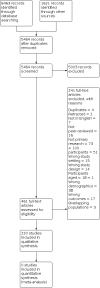COVID-19 and its cardiovascular effects: a systematic review of prevalence studies
- PMID: 33704775
- PMCID: PMC8078349
- DOI: 10.1002/14651858.CD013879
COVID-19 and its cardiovascular effects: a systematic review of prevalence studies
Abstract
Background: A small minority of people with coronavirus disease 2019 (COVID-19) develop a severe illness, characterised by inflammation, microvascular damage and coagulopathy, potentially leading to myocardial injury, venous thromboembolism (VTE) and arterial occlusive events. People with risk factors for or pre-existing cardiovascular disease may be at greater risk.
Objectives: To assess the prevalence of pre-existing cardiovascular comorbidities associated with suspected or confirmed cases of COVID-19 in a variety of settings, including the community, care homes and hospitals. We also assessed the nature and rate of subsequent cardiovascular complications and clinical events in people with suspected or confirmed COVID-19.
Search methods: We conducted an electronic search from December 2019 to 24 July 2020 in the following databases: the Cochrane Central Register of Controlled Trials (CENTRAL), MEDLINE, Embase, covid-19.cochrane.org, ClinicalTrials.gov and EU Clinical Trial Register.
Selection criteria: We included prospective and retrospective cohort studies, controlled before-and-after, case-control and cross-sectional studies, and randomised controlled trials (RCTs). We analysed controlled trials as cohorts, disregarding treatment allocation. We only included peer-reviewed studies with 100 or more participants, and excluded articles not written in English or only published in pre-print servers.
Data collection and analysis: Two review authors independently screened the search results and extracted data. Given substantial variation in study designs, reported outcomes and outcome metrics, we undertook a narrative synthesis of data, without conducting a meta-analysis. We critically appraised all included studies using the Joanna Briggs Institute (JBI) checklist for prevalence studies and the JBI checklist for case series.
Main results: We included 220 studies. Most of the studies originated from China (47.7%) or the USA (20.9%); 9.5% were from Italy. A large proportion of the studies were retrospective (89.5%), but three (1.4%) were RCTs and 20 (9.1%) were prospective. Using JBI's critical appraisal checklist tool for prevalence studies, 75 studies attained a full score of 9, 57 studies a score of 8, 31 studies a score of 7, 5 studies a score of 6, three studies a score of 5 and one a score of 3; using JBI's checklist tool for case series, 30 studies received a full score of 10, six studies a score of 9, 11 studies a score of 8, and one study a score of 5 We found that hypertension (189 studies, n = 174,414, weighted mean prevalence (WMP): 36.1%), diabetes (197 studies, n = 569,188, WMP: 22.1%) and ischaemic heart disease (94 studies, n = 100,765, WMP: 10.5%) are highly prevalent in people hospitalised with COVID-19, and are associated with an increased risk of death. In those admitted to hospital, biomarkers of cardiac stress or injury are often abnormal, and the incidence of a wide range of cardiovascular complications is substantial, particularly arrhythmias (22 studies, n = 13,115, weighted mean incidence (WMI) 9.3%), heart failure (20 studies, n = 29,317, WMI: 6.8%) and thrombotic complications (VTE: 16 studies, n = 7700, WMI: 7.4%).
Authors' conclusions: This systematic literature review indicates that cardiometabolic comorbidities are common in people who are hospitalised with a COVID-19 infection, and cardiovascular complications are frequent. We plan to update this review and to conduct a formal meta-analysis of outcomes based on a more homogeneous selected subsample of high-certainty studies.
Copyright © 2021 The Cochrane Collaboration. Published by John Wiley & Sons, Ltd.
Conflict of interest statement
PP declares no conflicts of interest.
GD declares no conflicts of interest.
CMW declares no conflicts of interest.
KSL declares no conflicts of interest.
KM declares grants to the institution from Chief Scientist Office, EPSRC Impact Acceleration Account (IAA) and Wellcome ISSF COVID Response Fund for research on COVID‐19. KM is involved in clinical duties involving patients with COVID‐19 and potential cardiovascular complications at NHS Greater Glasgow and Clyde, UK.
MA declares no conflicts of interest.
CB declares grants to the institution from the Chief Scientist Office for research on COVID‐19. CB treats patients with COVID‐19 at the Queen Elizabeth University Hospital, Glasgow, UK. CB also declares involvement in eligible studies for this review.
IS declares no conflicts of interest.
PDL declares no conflicts of interest.
AL has received speaker, advisory board or consultancy fees from Pfizer, Novartis, Servier, Astra Zeneca, Bristol Myers Squibb, Amgen, Takeda, Roche, Janssens‐Cilag Ltd, Clinigen Group, Eli Lily, Eisai Ltd, Ferring Pharmaceuticals, Boehringer Ingelheim, Akcea Therapeutics, Myocardial Solutions, iOWNA Health and Heartfelt Technologies Ltd. AL works as a Honorary Consultant Cardiologist for the Royal Brompton and Harefield Hospital NHS Trust.
AMcC declares no conflicts of interest.
RST declares no conflicts of interest.
JGFC declares funds to the institution from Vifor, Pharmacosmos, Ergofigure, Viscardia, Innolife, Pharmanord, Bayer; funds fore lecturers received by JGFC from Amgen, AstraZeneca, Bayer, Novartis, Servier, Vifor. JGFC also contributes to advisory boards of Amgen, Bayer, Novartis, Servier, Vifor and has received funds via the instititution for participating on a Data and Safety Monitoring Board for Idorsia.
Comment in
-
COVID-19 infection and cardiometabolic complications: short- and long-term treatment and management considerations.Rev Cardiovasc Med. 2021 Jun 30;22(2):263-265. doi: 10.31083/j.rcm2202031. Rev Cardiovasc Med. 2021. PMID: 34258892 No abstract available.
Publication types
MeSH terms
LinkOut - more resources
Full Text Sources
Other Literature Sources
Medical


